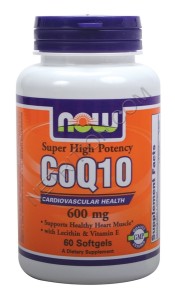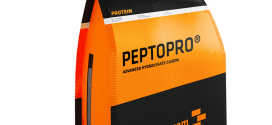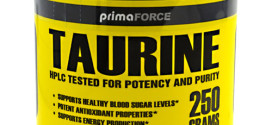Supplement Ingredient Guide: Co-Enzyme Q10 (CoQ10)

What is it?
CoQ10 is an enzyme found naturally within the body. It’s used in the process of creating energy and is used up is muscles which are constantly working, such as those of the heart. As people get older, natural levels of CoQ10 start to decrease. It’s been theorised that with this decrease, the likelihood of the onset of a chronic disease would increase.
CoQ10 also acts as a anti-oxidant which means that it’s able to control the oxidative reactions within the body, thus controlling the risk of chronic disease.
Indications
Supplementation with CoQ10 is indicated for those looking to improve athletic performance in terms of endurance, enhance the body’s fat:muscle ratio and to improve their rate of recovery.
How much should I take?
The recommended dose of CoQ10 is anything between 30-200mg daily. It’s a fat soluble enzyme therefore it’s best taken with a meal for optimum absorption.
Research
It’s been shown that supplementing the body with CoQ10 can improve the body’s tolerance of prolonged exercise allowing it to preform for longer. This is because CoQ10 helps the body offset muscle damage and fatigue. One can actually go further to say that it helps with recovering muscle damage. However, this effect was only noticed over short term period supplementations, and it’s unclear what the long term effects would be.
Research surrounding CoQ10′s ability to improve the body’s composition is very vague and still needs further research into the matter. Some evidence shows that it can increase the metabolic rate, however, it’s not understood why and this finding isn’t very consistent either throughout research.
Using CoQ10 is a prophylactic drug to help fight disease is something one might consider doing too. It’s been shown that CoQ10 can treat high blood pressure. But when it comes to other diseases, there isn’t the research to back it. It’s still in it’s infancy, so watch this space for further developments and updates.
Side effects
The only side effect associated with CoQ10 is it can cause a stomach upset in a minority of those taking it, however, for everyone else, it’s deemed safe.
References
1. Ho MJ, Bellusci A, Wright JM. Blood pressure lowering efficacy of coenzyme Q10 for primary hypertension. Cochrane Database Syst Rev. 2009 Oct 7;(4):CD007435.
2. Mizuno K, Tanaka M, Nozaki S, Mizuma H, Ataka S, Thara T, Sugino T, Shirai T, Kajimoto Y, Kuratsune H, Kajimoto O, Watanabe Y. Antifatigue effects of coenzyme Q10 during physical fatigue. Intl J of Applied & Basic Nutrl Sci 2008; 24: 293-99
3. Cooke M, Iosia M, Buford T, Shelmadine B, Hudson G, Kerksick C, Rasmussen C, Greenwood M, Leutholtz B, Willoughby D, Kreider R. Effects of acute and 14-day coenzyme Q10 supplementation on exercise performance in both trained and untrained individuals. J int Soc Sports Nutr. 2008; 5: 8
4. Daniells S. CoQ10 may cut muscle injuries for athletes. Nutraingredients.com 2008.
5. Ravaglia G., Forti P., Maioli F., Scali R.C., Boschi F., Cicognani A., Morini P., Gasbarrini G. Coenzyme Q10 plasma levels and body composition in elderly males (1996) Archives of Gerontology and Geriatrics, 22 (SUPPL.1), pp. 539-543.
6. Sarter B. Coenzyme Q10 and cardiovascular disease: a review. J Cardiovasc Nurs. 2002 Jul;16(4):9-20. Review.
 Supplement Judge Unbiased Supplement Reviews – Do they really work??
Supplement Judge Unbiased Supplement Reviews – Do they really work??




